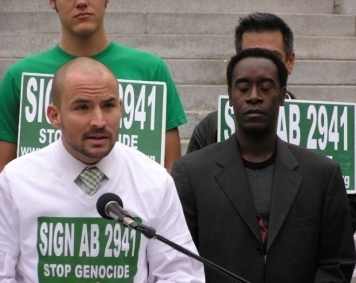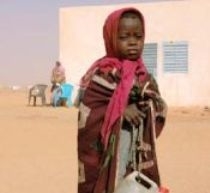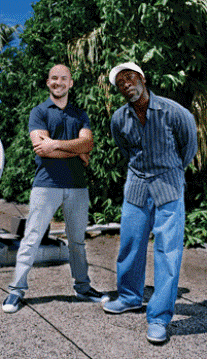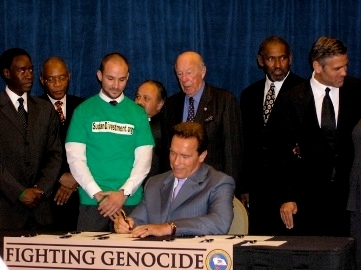 |
| Adam, with Don Cheadle, speaking about the importance of targeted divestment. |
Like those of millions of victims of genocide, Adam Sterling’s words kept falling on deaf ears.
A UCLA senior barely into his twenties, Adam was appalled at what he learned was happening in Sudan.
As an African Studies major, one of his classes had recently discussed the mass genocide in 1994 in Rwanda, where over one million people were killed in a 100 days.
Still in shock from this newfound knowledge, he was further appalled by an article he read that discussed the plight of refugees in Darfur.
The current problem in Darfur began in 2003, when the Sudanese government began funding the ‘Janjaweed,’ that is, Arab militias on horseback that would attack villages and hence, force people to flee for their lives. Although the government is primarily Arabic, the majority of Darfurians are ethnic Africans, and evidently, the government had different plans for the nation.
Since the conflict began, over 200,000 lives have been lost and 2 million people are now refugees of the government-sponsored genocide.
Horrified that something as unfathomable as the Rwandan genocide had occurred once in his lifetime, when he learned that it was, yet again, happening in Sudan, and had already occurred several times over the past few decades in other nations, Adam was shocked into action.
 |
| A Sudanese refugee. Photo courtesy of the International Rescue Committee and Not On Our Watch |
He was particularly struck by the plight of these victims, as his own Jewish grandmother had fled the Nazis in Germany. He grew up knowing about the Holocaust, which made these modern-day genocides all the more inconceivable to him. He could not grasp why world governments were allowing things like this to happen!
He took it upon himself to make a difference, and co-founded the Sudan Divestment Task Force, lobbying for states to divest from, that is, stop investments in, companies doing business with the Sudanese government.
Sudan, a poor nation with an average yearly salary of $600, brings in billions through oil revenues, yet money is invested into the military, not the people.
Lacking capita and expertise, Sudan’s government brings in foreign oil companies to create revenue from Sudanese oil reserves -- and investors, using state pension funds, the mutual funds and stocks owned by state residents, invest in these companies, allowing them to continue their business in Sudan.
Most shareholders are unaware that this is occurring, yet as partial owners of these companies through stocks, those working towards divestment feel that these shareholders have the right to know, to demand that their investments not be used in the financing of genocide, and to demand that investments in those companies be sold.
 |
| Adam Sterling and Don Cheadle |
At the time, as a college student, Adam’s work primarily consisted of handing out fliers and giving presentations to bring about awareness to the atrocities in Sudan, and the part that these investments played in it. Most of the time, his audiences were small.
In fact, he has said that it was difficult to even get his college newspaper to run stories on Darfur.
Wanting to make a larger impact and not receiving the response the people of Darfur so desperately needed, he started to work on a larger scale.
As a California resident, although he had no experience in the political arena, he focused his work on lobbying for a bill prohibiting California from using its pension system to invest in these Sudan-affiliated companies.
Every single week he would work Wednesday through Sunday as a waiter in Los Angeles, then fly up to Sacramento to lobby on Mondays and Tuesdays.
In late 2005 he invited actor Don Cheadle to UCLA to discuss Darfur, and yet again, they were greeted by an unbearably small audience – eight people, to be exact.
Yet Cheadle, who during the filming of 2004’s Hotel Rwanda had traveled in Africa, and had been so stunned by what he saw in Darfur, sensed the grand potential of Adam’s work.
In fact, Cheadle, who would later found the nonprofit ‘Not On Our Watch’ along with other big Hollywood names, would later say that Adam’s work, along with that of John Prendergast and Congressman Ed Royce and others, is what truly propelled him in his campaign to help Darfur.
Theodore ‘Ted’ Braun began work on a new documentary, called Darfur Now which chronicles the work of six people passionately involved in the battle to find a resolution in Darfur. Among them, Cheadle, himself, who also served as the film’s producer, and Adam Sterling.
Although Adam had no acting experience, nor did the vast majority of the others featured in the film, Darfur Now received great acclaim, and today, only a couple of years after Adam’s work began, Darfur is at the forefront of international thought.
 |
| California Governor Schwarzenegger signing the bill into law, with Sterling, Clooney, and Cheadle present. |
In September of 2006, California Governor Arnold Schwarzenegger finally signed into law the bill that Adam had devoted himself to, with Adam, Cheadle, and actor George Clooney (also a Darfur-activist) present.
Today, Adam is a 2008 Br!ck Awards finalist, a prestigious award which honor young people making a difference in the world.
He is also the director of the Genocide Intervention Network’s Sudan Divestment Task Force in Washington, D.C.
And to think that the same young man who only a few years ago had an audience of eight at his collegiate event on Darfur, today goes before the U.S. Senate as a divestment expert, and has helped 20 other states pass laws similar to the one in California. Truly, Adam Sterling’s life shows that with the passion and dedication of a hero’s heart, anything is possible.
Page created on 2/3/2013 3:23:17 PM
Last edited 2/3/2013 3:23:17 PM

The BR!CK Awards is the first televised award show about changing the world.
It celebrates young people making our world better.
BR!CK Award winners aren't just the leaders of tomorrow. They are the leaders of today.